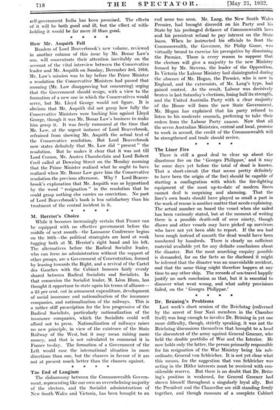How Mr. Asquith Fell Readers of Lord Beaverbrook's new volume,
reviewed in another column of this issue by Mr. Bonar Law's son, will concentrate their attention inevitably on the account of the vital interview between the Conservative leader and Mr. Asquith on Sunday, December 3rd, 1916. Mr. Law's mission was to lay before the Prime Minister a resolution the Conservative Ministers had passed that morning (Mr. Law disapproving but concurring) urging that the Government should resign, with a view to the formation of a new one in which the Conservatives would serve, but Mr. Lloyd George would not figure. It is obvious that Mr. Asquith did not grasp how fully the Conservative Ministers were backing him against Lloyd George, though it was Mr. Bonar Law's business to make him grasp it. It was freely rumoured at the time that Mr. Law, at the urgent instance of Lord Beaverbrook, refrained from showing Mr. Asquith the actual text of the Conservative resolution. But Lord Beaverbrook now states definitely that Mr. Law did " present " the resolution. But he makes it clear that it was not till Lord Curzon, Mr. Austen Chamberlain and Lord Robert Cecil called at Downing Street on the Monday morning that the Prime Minister realized what he ought to have realized when Mr. Bonar Law gave him the Conservative resolution the previous afternoon. Why ? Lord Beaver- brook's explanation that Mr. Asquith was so hypnotized by the word " resignation " in the resolution that he could grasp nothing else carries no conviction. No part of Lord Beaverbrook's book is less satisfactory than his treatment of the central incident in it.
* * *




































 Previous page
Previous page